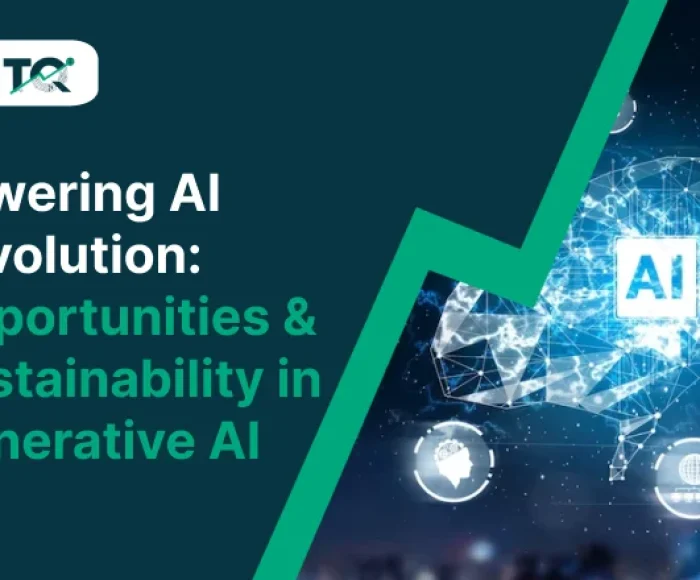Generative Artificial Intelligence (AI) has emerged as a transformative force, reshaping industries and pushing the boundaries of what technology can achieve. However, alongside its revolutionary capabilities comes a significant energy demand, raising questions about sustainability and infrastructure. As generative AI continues its exponential growth trajectory, understanding its energy requirements and potential impact becomes crucial. In this blog, we delve into the implications of powering the AI revolution, exploring opportunities for data centers and power providers while considering sustainability aspects.
Understanding The Energy Demand
The growth of generative AI is unprecedented, with projections indicating a staggering 70% annual increase in energy demand. By 2027, the energy consumed by generative AI could rival the entire power usage of a country like Spain. This surge presents both challenges and opportunities for various stakeholders, from data center operators to renewable energy providers.
Opportunities in Data Center Infrastructure
Data centers play a pivotal role in supporting the computational needs of generative AI applications. As demand escalates, so does the need for robust data center infrastructure. Companies involved in building and maintaining data centers stand to benefit significantly from this trend.
Expansion and Construction:
- With the surge in demand for generative AI, there’s a pressing need for new data centers and the expansion of existing ones. Consequently, this translates into a wealth of opportunities for companies specializing in construction and engineering.
- Construction firms can capitalize on the need for purpose-built data center facilities, incorporating cutting-edge design principles to maximize efficiency and sustainability.
- Engineering firms play a crucial role in designing and implementing robust infrastructure solutions, from power distribution systems to advanced cooling mechanisms, tailored to the specific requirements of generative AI workloads.
Technological Innovation:
- The relentless pursuit of performance optimization drives innovation within the data center ecosystem. Companies focusing on developing next-generation hardware and software solutions stand to benefit.
- Innovations in processor architectures, such as accelerators optimized for AI workloads, can significantly enhance the computational efficiency of data centers, thereby reducing energy consumption.
- Advancements in data center management software, including AI-driven predictive analytics and automation tools, enable operators to optimize resource allocation and mitigate downtime, improving overall operational efficiency.
Energy Efficiency and Sustainability:
- The exponential growth of data centers has raised concerns about their environmental impact, particularly in terms of energy consumption and carbon emissions.
- Companies specializing in energy-efficient infrastructure solutions, such as modular data center designs, liquid cooling technologies, and renewable energy integration, are poised to thrive in this burgeoning market.
- Sustainability initiatives, including the adoption of green building standards and renewable energy sourcing, not only align with environmental objectives but also offer cost-saving opportunities for data center operators in the long run.
Edge Computing and Distributed Infrastructure:
- The proliferation of IoT devices and real-time applications necessitates the deployment of edge computing infrastructure to minimize latency and bandwidth constraints.
- Companies at the forefront of edge computing technologies, including edge data centers and micro-data centers, can capitalize on the growing demand for distributed computing resources.
- Edge computing architectures complement centralized data centers by offloading processing tasks closer to the point of data generation. Consequently, this enables more efficient and responsive AI applications.
Managed Services and Outsourcing:
- As the complexity of data center operations increases, many organizations opt to outsource management and maintenance tasks to specialized service providers.
- Managed service providers offer a range of services, including colocation, cloud hosting, and managed security, catering to the diverse needs of businesses leveraging generative AI.
- Outsourcing data center operations allows organizations to focus on their core competencies while benefiting from the expertise and scalability offered by third-party providers.
Investment Opportunities
- Integrated Power Management Systems: With the growing demand for computing power, integrated power management systems become essential for optimizing energy usage within data centers.
- Property Owners and Suppliers: Companies specializing in industrial properties and suppliers of cooling systems, racks, and processing units are poised to capitalize on the burgeoning data center market.
- Flash Storage Systems: As data storage requirements skyrocket, companies offering efficient storage solutions will witness increased demand.
Energizing Power Providers
The expansion of generative AI relies heavily on the availability of power infrastructure. Power providers need to upscale their capacity to meet the surging demand from data centers. This presents lucrative opportunities for various segments within the power sector.
Benefiting Segments
- Regulated Utilities: Utilities capable of scaling up infrastructure to meet data center demands stand to gain substantial earnings. However, significant capital investments may be necessary to accommodate the increased load.
- Fuel Cell Manufacturers: Fuel cells offer reliable power generation, particularly for data centers aiming to integrate renewable energy sources. Manufacturers providing these solutions will experience heightened demand.
- Nuclear Power Generators: Nuclear power presents a viable option for providing uninterrupted power to data centers, potentially reducing operational costs.
- Providers of Power Purchase Agreements (PPAs): PPAs facilitate long-term agreements for electricity supply, offering stability to data centers reliant on renewable energy sources.
Sustainability Considerations
Despite concerns regarding its energy consumption, generative AI holds promise for advancing sustainability efforts. By optimizing power grids, enhancing agricultural practices, and improving weather forecasting, AI can contribute to mitigating climate change impacts. Moreover, data center operators are increasingly adopting renewable energy sources to meet their electricity needs, aligning with decarbonization goals.
Conclusion
The proliferation of generative AI presents a double-edged sword concerning energy consumption. While it poses challenges in terms of scalability and sustainability, it also unlocks unprecedented opportunities for innovation and investment. By leveraging advancements in data center infrastructure and collaborating with power providers, the AI revolution can be powered sustainably, driving positive impacts across industries. As we navigate this transformative era, striking a balance between technological advancement and environmental stewardship will be paramount in shaping a future powered by AI.
In summary, the AI revolution demands careful consideration of its energy implications, but it also holds immense potential for driving sustainability and innovation on a global scale. By harnessing the power of generative AI responsibly, we can pave the way for a brighter and more sustainable future.
Check Out our AI & Robotics Defence Sector Pitch Deck Template




